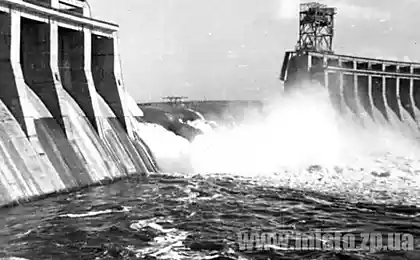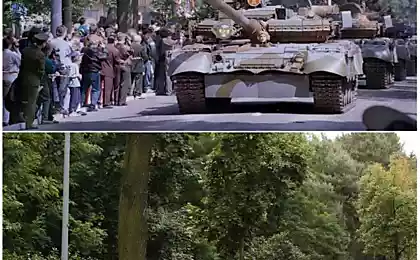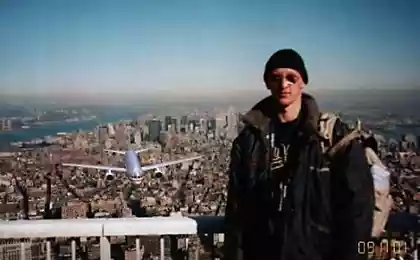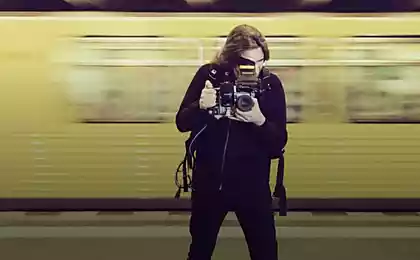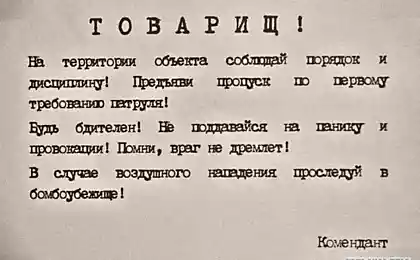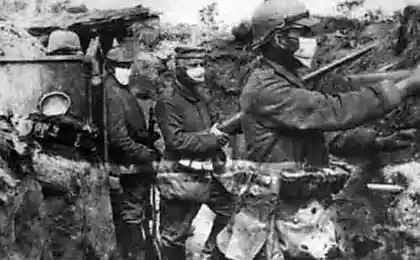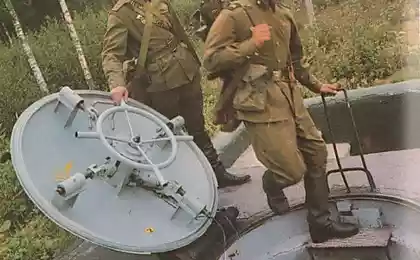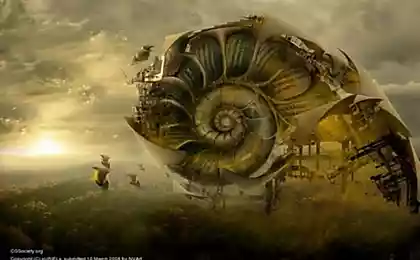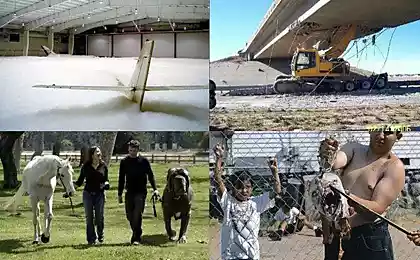865
Military correspondent of work (4 photos)
Photojournalist of The New York Times Joao Silva talks about his work, a year after he lost both legs blown up by a mine in Kandahar.
"At the very moment when I stepped on a mine the morning of 23 October 2010, I was quite soberly assess what is happening. Around me were dying so many people, and I have died at the hands of friends - I am not exaggerating - that when it happened, I just thought, "All clear. My turn. It's time. " It was an unremarkable morning - the same as always, when you go out with the military. There were no signs of trouble. We were not shot. Normal border patrol. Soldiers who do not fall on the page The New York Times, and the rest of the newspapers, too, to be honest. So here was this morning.
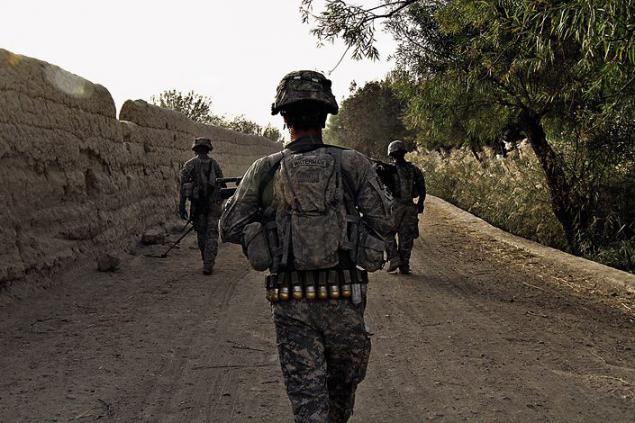
Kandahar, Arghandab district. Sapper Group - Private Laplaunt (left), Sergeant Maxwell (right) and cover both Sergeant Waterman (center) - is ahead of the platoon, checking rural roads and neighborhood I was third in the chain. Man, that was the first, led the service dog. Behind him was another in charge of security, and then I. Its not the dog smelled. Then it came the guys, but nothing happened. And for me it worked. I heard a mechanical click. I realized that this is not good. Woke up, already lying on the ground face down, wrapped in a cloud of dust, with a clear understanding: just mine exploded, expect nothing good.
I saw that my leg is gone, and all around covered surprise. I said, "Guys, help to me." And they turned and saw me on the ground and immediately got down to business. Dragged me out of the affected area for a couple of meters. There have already arrived, and doctors began for me. I picked up a camera, took a few pictures. Frankly, they were not very good, but I was trying to capture the event. I know that things are bad, but I felt that he was alive. Adrenaline flooded. I was sane and aware of everything that happened. So, I made a couple of shots. Then he dropped his camera and went to Plan B, which was to pick up the phone. I dialed the number Vivian, his wife, and said, "I do not have legs, but to live, probably will." By the way, I have two children. Then he handed the phone correspondent that she talked to Vivian and reassured her.
Then I lay back to have a cigarette. Meanwhile, doctors frantically made me something: harnesses, injections directly into the chest and a host of absolutely beautiful things. These guys saved my life. Helicopter landed to transport me to a safe place. Before I was inside the helicopter, I was in complete and absolute consciousness. There I finally passed out.
With me has happened is nothing new. Journalists are killed or maimed since time immemorial. Ever since then, when someone took the camera for the first time on the battlefield. And I had the misfortune to be among them. That day I desperately unlucky, and at the same time incredibly lucky. Mina was chained to a barrel, which was about 15 pounds of homemade explosives, and for some reason it did not explode. Had this second explosion, what is left of me, would easily fit in a matchbox. It's amazing what surprises sometimes life brings. Call it God's Providence, call luck, but somehow you call - I am very grateful.
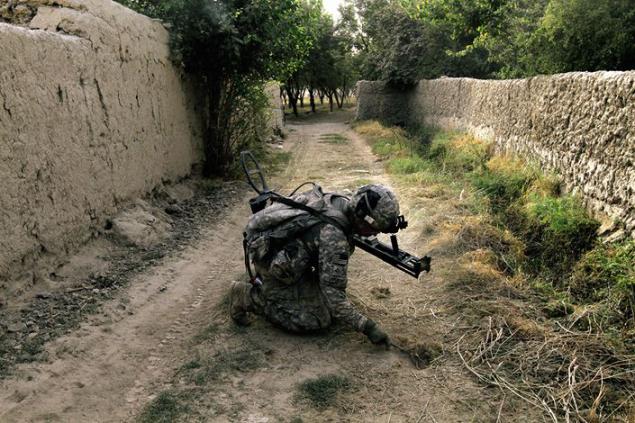
Group draws attention to any foreign objects, including explosive craters previously detected mines
Now I am at the Center Walter Reed (Army Medical Center Walter Reed in Washington, the largest US military hospital. - Esquire) There are days when do not want to get out of bed. But each new day convinces me how lucky I am. There is always someone who is worse. Young twenties guys - and they amputated three limbs and genitals, and they will have to start life anew. It is not easy. There are many children suffering from depression, they are very painful experience it all.
But it is also encouraging - because you learn to understand: how do not you been bad, someone worse than you.
Since then, it took nine months. For the profession fell on hard times. Particularly nasty stood out in April. We lost three friends - Tim, Chris and Anthony (Tim Hetherington, Chris Hondros and Anton Hammerl - military photojournalists killed in Libya in spring 2011. - Esquire). Libya was a lady with a sharp temper.
Probably, it will be a year before I come completely back to normal. In the meantime, I need a little more courage, stamina and a bit - if we speak frankly - a bit more drugs than I am able to swallow.
When I saw that I had no feet, I did not realize how serious it is. Only felt on some instinctive level, that everything will be okay. I did not know that the explosion damaged the urethra. That I injured internal organs. That damaged the anus and I developed sepsis. It is because of this I was almost dead. The struggle was against bacteria, not the legs.
Usually after the amputation to the point where you're already standing on the prosthesis, it takes about ten weeks. In my case, it was about five months, because my body continued to attack the infection. Doctors had to completely restore the anus and urethra. Seven months I peed in a plastic bag through a tube. Fortunately, it all behind. I still use an ileostomy, but the last operation and fix it.
I think I've reached a stage where it is again one. That is, of course, my feet no more. And they will never grow up. But you know, it's nothing. However, nothing. I'm alive, I'm here. Life is not over yet.
I am often asked: "How can you just stand there and look at the people who cut each other, and even pictures of all of this?" But you need to clearly understand their role. If you want to help people, it is not necessary to become a photographer. Although we still help. I do not just ship wounded in the back seat of his car and raced to the hospital with them.
Just unfortunately, sometimes the images are obtained so strong that it seems that behind the camera - not a person but a machine. And it is not. Picture that captures the eye, immediately imprinted in the mind. And some of these pictures do not leave us for ever.
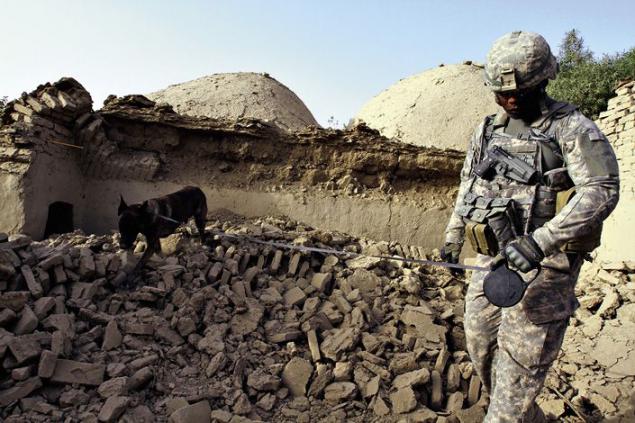
Sergeant Maxwell, senior official on a leash dog - a frame made by Joao Silva for a few seconds before the explosion
My closest friend Kevin Carter (South African photographer, one of the four members of the Commonwealth Bang Bang Club, in which in the early 1990s, was part of Silva. - Esquire) eventually committed suicide. He took the famous picture in the Sudan: in the mud, face down, is a girl, and her vulture watches. He was very criticized for this photo. People who did not have the slightest idea about what motivated him when he took this picture - they criticized him up until he finally became entangled in its internal contradictions. He committed suicide a month after being awarded a Pulitzer.
People believe the default Behold, heartless photographer was just passing by the child and pressed the button. In fact, the child was a few hundred meters from the humanitarian mission with a soup kitchen. But this is the power of photography. You are allocated a particular image, and this allows it to broadcast, and it was a strong image. He sent news of the famine. And suddenly, out of nowhere, in the Sudan flowed money. Having made this picture, he saved more lives than if it had not made it. On the other side of the lens - a living person, and that person wants to get a message to convey it to the world and still survive.
I became a photographer by accident. In high school I never went into any fotokruzhke. My friend studied graphic design, and one of the things he was a photograph. Once he was given the job on the theme of speed, movement. He went with us to the race track to take pictures of the car, and then I thought, "Well, well, and in this role, I can see myself. Such a thing to my taste ».
Then I made my first life in pictures. And I'm like a fly bites. From that moment on, I knew exactly what I wanted to do. Then just ended apartheid, Nelson Mandela was released, and the whole country was flooded with political violence - a brutal, such that requires close-ups. For four years in South Africa killed 15 thousand, and then all of 20 thousand people, while there were no tanks or artillery. All this happened in my home country, at the doorstep of my house, and I felt the need to be there - all documented and tell the world that the people perish.
I started to move around Africa and faced with a host of other conflicts. It must be said, the war - not only what I was doing. I do not like to call himself a war photographer. Of course, this is my specialty, my passion. But to visit the war - is not the only duty of the photojournalist.
At Walter Reed, I was not attracted to photograph. The first five weeks I was in intensive care. I was so drugged that I remember that time very vague. On the operating table, I went through the day. Only seven and a half months I was able to get out of bed. Then I was sent to the Center of intensive rehabilitation (Department of Military Medical Center Walter Reed. - Esquire) for the military, where all train sailors and soldiers with amputated limbs. First I went to bed, and on it I raised on sport mat, where we did the exercises. After some time I learned automatic wheelchair.
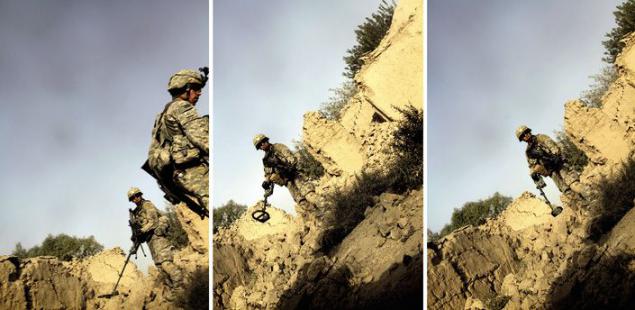
A few seconds after the explosion seriously injured Joao Silva takes another three shots, and then releases the camera from the hands
While lying in the House in the recovery room, before you set goals. Doctors vying say, "So, now you need to go to the next level." Specialist or physical therapist says: "In the next month we will do a test on the weight load, and after you can walk." And you think, "Oh, wow. Well, that's something. There concentrate on anything ».
Now I outpatients live in a special town for wounded soldiers and their families. But I have yet to return. I will make a cross-section to tighten your abdominal muscles to lift the colostomy and relink the intestine to the colon.
On the rehabilitation process will take most likely another year. I need to learn to do without a cane. Need to re-learn how to run - and when I say run, I do not mean to run on artificial limbs. I have to run on these feet here, so that when I get back to work, to be able to short dashes (Juan Silva legs amputated below the knee. - Esquire). A graceful running will not name, but it must still be running. Especially, I think now I'm in any way on the other side of grace.
I'll take pictures again. Will continue to work for The New York Times. It's just a matter of time.
If I can go back to the military journalism, and will do. Doubts on that score I do not have.
We formulate it this way: the legs I have no more, but I'm still going to lead one day his daughter down the aisle. Still, I see how my son will grow and how it into something plunge.
While they are still too small. "The Pope has no legs - but he has now his feet like a robot, cool." Well, you know: "My dad - a transformer!" We hid nothing from them; We explained to them what happened, as an adult. It may sound corny, but I want them to be proud of me ».
Source
"At the very moment when I stepped on a mine the morning of 23 October 2010, I was quite soberly assess what is happening. Around me were dying so many people, and I have died at the hands of friends - I am not exaggerating - that when it happened, I just thought, "All clear. My turn. It's time. " It was an unremarkable morning - the same as always, when you go out with the military. There were no signs of trouble. We were not shot. Normal border patrol. Soldiers who do not fall on the page The New York Times, and the rest of the newspapers, too, to be honest. So here was this morning.

Kandahar, Arghandab district. Sapper Group - Private Laplaunt (left), Sergeant Maxwell (right) and cover both Sergeant Waterman (center) - is ahead of the platoon, checking rural roads and neighborhood I was third in the chain. Man, that was the first, led the service dog. Behind him was another in charge of security, and then I. Its not the dog smelled. Then it came the guys, but nothing happened. And for me it worked. I heard a mechanical click. I realized that this is not good. Woke up, already lying on the ground face down, wrapped in a cloud of dust, with a clear understanding: just mine exploded, expect nothing good.
I saw that my leg is gone, and all around covered surprise. I said, "Guys, help to me." And they turned and saw me on the ground and immediately got down to business. Dragged me out of the affected area for a couple of meters. There have already arrived, and doctors began for me. I picked up a camera, took a few pictures. Frankly, they were not very good, but I was trying to capture the event. I know that things are bad, but I felt that he was alive. Adrenaline flooded. I was sane and aware of everything that happened. So, I made a couple of shots. Then he dropped his camera and went to Plan B, which was to pick up the phone. I dialed the number Vivian, his wife, and said, "I do not have legs, but to live, probably will." By the way, I have two children. Then he handed the phone correspondent that she talked to Vivian and reassured her.
Then I lay back to have a cigarette. Meanwhile, doctors frantically made me something: harnesses, injections directly into the chest and a host of absolutely beautiful things. These guys saved my life. Helicopter landed to transport me to a safe place. Before I was inside the helicopter, I was in complete and absolute consciousness. There I finally passed out.
With me has happened is nothing new. Journalists are killed or maimed since time immemorial. Ever since then, when someone took the camera for the first time on the battlefield. And I had the misfortune to be among them. That day I desperately unlucky, and at the same time incredibly lucky. Mina was chained to a barrel, which was about 15 pounds of homemade explosives, and for some reason it did not explode. Had this second explosion, what is left of me, would easily fit in a matchbox. It's amazing what surprises sometimes life brings. Call it God's Providence, call luck, but somehow you call - I am very grateful.

Group draws attention to any foreign objects, including explosive craters previously detected mines
Now I am at the Center Walter Reed (Army Medical Center Walter Reed in Washington, the largest US military hospital. - Esquire) There are days when do not want to get out of bed. But each new day convinces me how lucky I am. There is always someone who is worse. Young twenties guys - and they amputated three limbs and genitals, and they will have to start life anew. It is not easy. There are many children suffering from depression, they are very painful experience it all.
But it is also encouraging - because you learn to understand: how do not you been bad, someone worse than you.
Since then, it took nine months. For the profession fell on hard times. Particularly nasty stood out in April. We lost three friends - Tim, Chris and Anthony (Tim Hetherington, Chris Hondros and Anton Hammerl - military photojournalists killed in Libya in spring 2011. - Esquire). Libya was a lady with a sharp temper.
Probably, it will be a year before I come completely back to normal. In the meantime, I need a little more courage, stamina and a bit - if we speak frankly - a bit more drugs than I am able to swallow.
When I saw that I had no feet, I did not realize how serious it is. Only felt on some instinctive level, that everything will be okay. I did not know that the explosion damaged the urethra. That I injured internal organs. That damaged the anus and I developed sepsis. It is because of this I was almost dead. The struggle was against bacteria, not the legs.
Usually after the amputation to the point where you're already standing on the prosthesis, it takes about ten weeks. In my case, it was about five months, because my body continued to attack the infection. Doctors had to completely restore the anus and urethra. Seven months I peed in a plastic bag through a tube. Fortunately, it all behind. I still use an ileostomy, but the last operation and fix it.
I think I've reached a stage where it is again one. That is, of course, my feet no more. And they will never grow up. But you know, it's nothing. However, nothing. I'm alive, I'm here. Life is not over yet.
I am often asked: "How can you just stand there and look at the people who cut each other, and even pictures of all of this?" But you need to clearly understand their role. If you want to help people, it is not necessary to become a photographer. Although we still help. I do not just ship wounded in the back seat of his car and raced to the hospital with them.
Just unfortunately, sometimes the images are obtained so strong that it seems that behind the camera - not a person but a machine. And it is not. Picture that captures the eye, immediately imprinted in the mind. And some of these pictures do not leave us for ever.

Sergeant Maxwell, senior official on a leash dog - a frame made by Joao Silva for a few seconds before the explosion
My closest friend Kevin Carter (South African photographer, one of the four members of the Commonwealth Bang Bang Club, in which in the early 1990s, was part of Silva. - Esquire) eventually committed suicide. He took the famous picture in the Sudan: in the mud, face down, is a girl, and her vulture watches. He was very criticized for this photo. People who did not have the slightest idea about what motivated him when he took this picture - they criticized him up until he finally became entangled in its internal contradictions. He committed suicide a month after being awarded a Pulitzer.
People believe the default Behold, heartless photographer was just passing by the child and pressed the button. In fact, the child was a few hundred meters from the humanitarian mission with a soup kitchen. But this is the power of photography. You are allocated a particular image, and this allows it to broadcast, and it was a strong image. He sent news of the famine. And suddenly, out of nowhere, in the Sudan flowed money. Having made this picture, he saved more lives than if it had not made it. On the other side of the lens - a living person, and that person wants to get a message to convey it to the world and still survive.
I became a photographer by accident. In high school I never went into any fotokruzhke. My friend studied graphic design, and one of the things he was a photograph. Once he was given the job on the theme of speed, movement. He went with us to the race track to take pictures of the car, and then I thought, "Well, well, and in this role, I can see myself. Such a thing to my taste ».
Then I made my first life in pictures. And I'm like a fly bites. From that moment on, I knew exactly what I wanted to do. Then just ended apartheid, Nelson Mandela was released, and the whole country was flooded with political violence - a brutal, such that requires close-ups. For four years in South Africa killed 15 thousand, and then all of 20 thousand people, while there were no tanks or artillery. All this happened in my home country, at the doorstep of my house, and I felt the need to be there - all documented and tell the world that the people perish.
I started to move around Africa and faced with a host of other conflicts. It must be said, the war - not only what I was doing. I do not like to call himself a war photographer. Of course, this is my specialty, my passion. But to visit the war - is not the only duty of the photojournalist.
At Walter Reed, I was not attracted to photograph. The first five weeks I was in intensive care. I was so drugged that I remember that time very vague. On the operating table, I went through the day. Only seven and a half months I was able to get out of bed. Then I was sent to the Center of intensive rehabilitation (Department of Military Medical Center Walter Reed. - Esquire) for the military, where all train sailors and soldiers with amputated limbs. First I went to bed, and on it I raised on sport mat, where we did the exercises. After some time I learned automatic wheelchair.

A few seconds after the explosion seriously injured Joao Silva takes another three shots, and then releases the camera from the hands
While lying in the House in the recovery room, before you set goals. Doctors vying say, "So, now you need to go to the next level." Specialist or physical therapist says: "In the next month we will do a test on the weight load, and after you can walk." And you think, "Oh, wow. Well, that's something. There concentrate on anything ».
Now I outpatients live in a special town for wounded soldiers and their families. But I have yet to return. I will make a cross-section to tighten your abdominal muscles to lift the colostomy and relink the intestine to the colon.
On the rehabilitation process will take most likely another year. I need to learn to do without a cane. Need to re-learn how to run - and when I say run, I do not mean to run on artificial limbs. I have to run on these feet here, so that when I get back to work, to be able to short dashes (Juan Silva legs amputated below the knee. - Esquire). A graceful running will not name, but it must still be running. Especially, I think now I'm in any way on the other side of grace.
I'll take pictures again. Will continue to work for The New York Times. It's just a matter of time.
If I can go back to the military journalism, and will do. Doubts on that score I do not have.
We formulate it this way: the legs I have no more, but I'm still going to lead one day his daughter down the aisle. Still, I see how my son will grow and how it into something plunge.
While they are still too small. "The Pope has no legs - but he has now his feet like a robot, cool." Well, you know: "My dad - a transformer!" We hid nothing from them; We explained to them what happened, as an adult. It may sound corny, but I want them to be proud of me ».
Source
